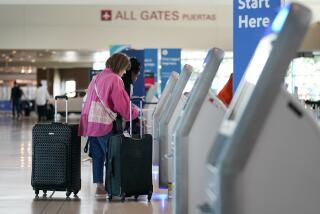Airlines’ Assn. Chief Calls for New Agency to Oversee Air Travel
- Share via
The national president of the commercial airlines’ trade association called Friday for the establishment of a new aviation agency that would oversee the operational end of domestic air travel, leaving the Federal Aviation Administration to deal with safety matters.
William F. Bolger, president of the Air Transport Assn., said the National Aviation Authority would be a federal corporation, “run like a business,” that would be responsible for long-term planning and adopting policies and procedures that would reduce delays at overcrowded airports.
Bolger, speaking to a Town Hall of California meeting at the Irvine Hilton, also called for more air traffic controllers and the replacement of outdated radar and computer equipment.
Insisting that “it is perfectly safe to fly,” Bolger pointed out that there not not been a single domestic air travel passenger fatality in 14 months, or about 7 million flights. (The 67 passengers and crew who died when the Aeromexico jetliner collided with a private plane over Cerritos in September are considered international flight fatalities.)
“But in matters of aviation safety, however good the record is, there can never be complacency, as recent events in this area have attested so starkly,” he said. In a press conference after the speech, he acknowledged that despite the fatality record, the number of near-misses in between private and commercial aircraft appears to be increasing.
The airline industry supports actions that control the mix of commercial and private aircraft, he said. These include more airports for general aviation and a rule recently proposed by the FAA that would require all private planes flying near major airports to have equipment that sends signals relaying their altitude to air traffic controllers, he said.
The industry also supports adding at least 1,000 more air traffic controllers to the current ranks, which number 14,500, he said, adding that Congress has authorized hiring only 500 more. In addition, controllers are using 1960-vintage computers that must be replaced, he said. New software also must be purchased for the modernized equipment, which could cost $10 billion over the next several years, he said.
He noted that the demand for air travel is continually growing, especially in Southern California. Last summer, passengers nationwide experienced 2,500 delays daily, the equivalent of grounding 250 airplanes, or a major airline each day. One airline reported that the delays are costing it 7 1/2% of its total revenues, while others have bought extra aircraft because of the delays, he said.
“This delay situation is intolerable, and it will get even worse if we don’t make some changes,” he said.
Courageous Decisions
“A new approach is needed to get the job done. Courageous public policy decisions are necessary and they must come soon,” he said.
The new agency--a federally sanctioned but independent authority parallel in standing to the Federal Deposit Insurance Corp. and the U.S. Postal Service--would be able to make long-range plans because, unlike the FAA, it would not be subject to the political current and Congress’s year-to-year budget appropriations, he said.
The National Aviation Authority would tap a $4.3-billion aviation trust fund surplus that is supposed to be spent to improve the safety and capacity of the nation’s airways, he said. The fund--compiled from the 8% tax on domestic flight fares and $3 charge on international departures--is expected to grow to $10 billion by 1989, he said, but it has been “shackled” because “Congress and the Administration haven’t gotten around to taking the steps to spend it.”
Bolger said legislation to establish the National Aviation Authority is expected to be introduced in Congress early in its next session. Later, he declined to say which legislators had been approached to sponsor it.
Areas of Responsibility
Under the proposal, the new authority would administer the air traffic control system and oversee a program to aid airport development, while the FAA would continue to be responsible for aviation safety regulation, air transport security, international affairs and research and engineering not related to air traffic control.
Still, 70 to 80% of the FAA’s personnel now are involved in operational matters and would be transferred to the new authority, if it is approved, he said.
“A federal authority would be able to manage a work force better, would be able to hire an adequate number of controllers and to react promptly and responsively to the service needs of an expanding population of aviation users,” he said.
It could also dictate new air traffic control procedures that will reduce delays while not compromising safety, he said.
More to Read
Inside the business of entertainment
The Wide Shot brings you news, analysis and insights on everything from streaming wars to production — and what it all means for the future.
You may occasionally receive promotional content from the Los Angeles Times.










